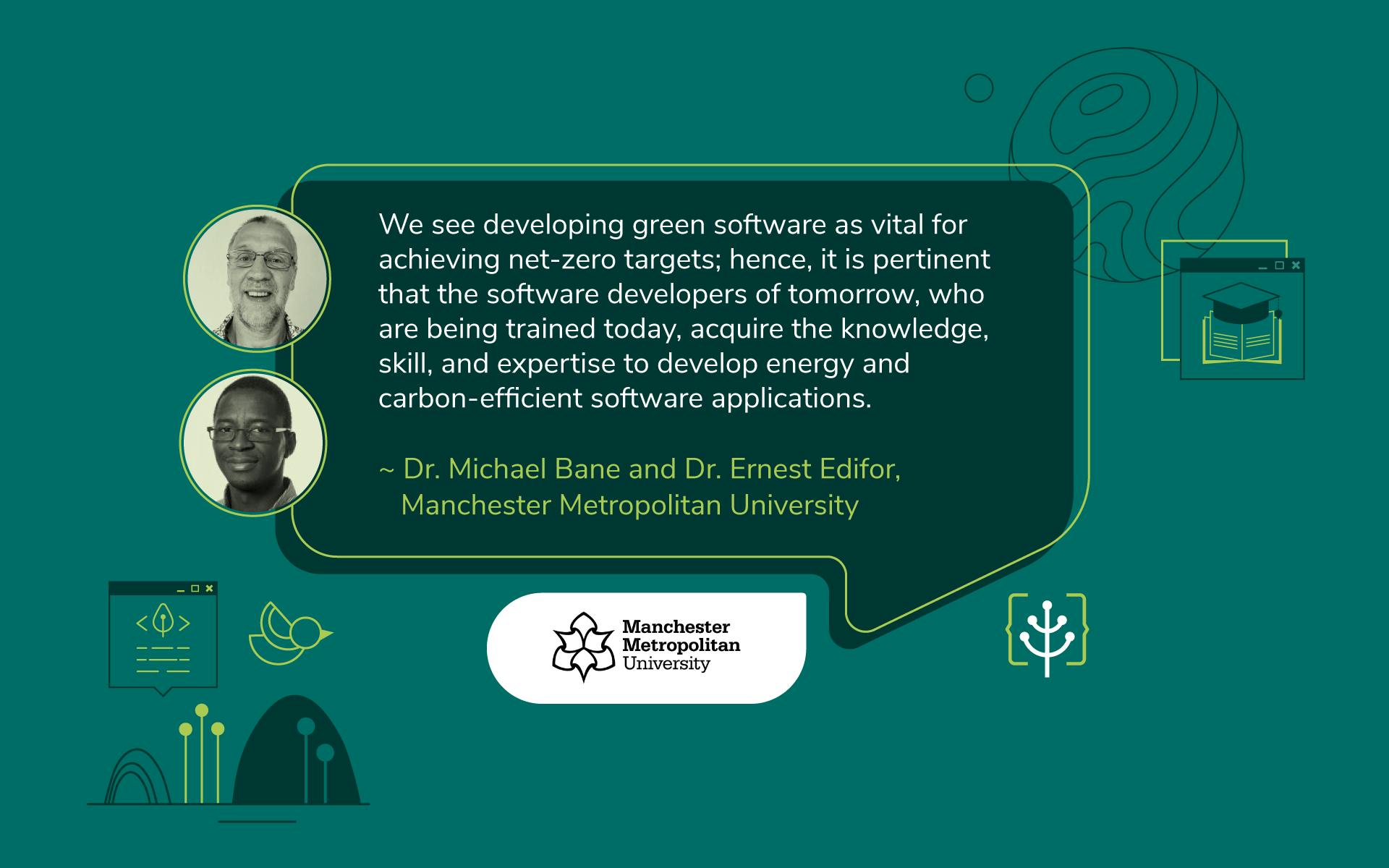We see developing green software as vital for achieving net-zero targets; hence, it is pertinent that the software developers of tomorrow, who are being trained today, acquire the knowledge, skill, and expertise to develop energy and carbon-efficient software applications.
Michael is a Senior Lecturer at Manchester Metropolitan University (McrMet). With decades of experience in high-end computing and sustainability, he recently delivered the inaugural “Green Software Engineering” (GSE) course to undergraduate students.
Together with Ernest, a Reader in Digital Education at Manchester Met, they’ve strived to advance the teaching of green software engineering across universities and colleges in the UK.
Can you tell us about McrMet?
McrMet celebrated its 200th anniversary this year, marking two centuries of driving progress through the power of education and research.
We aim to be a sustainability leader in the education sector. We are proud of our achievements, including the second place in the 1st Class University in the People and Planet University League 2023/24 and runner-up in the Sustainable University of the Year in The Times and Sunday Times Good University Guide 2025 ranking.
How important is software sustainability to McrMet?
As computing systems have become ubiquitous, increasingly more demand is placed on computing resources that require electrical energy to run and, therefore, are significantly contributing to carbon emissions. These emissions relate to using, developing, and deploying software across computing systems.
We see developing green software as vital for achieving net-zero targets; hence, it is pertinent that the software developers of tomorrow, who are being trained today, acquire the knowledge, skill, and expertise to develop energy and carbon-efficient software applications.
Why did you join GSF?
The Green Software Foundation has established itself as a primary and formidable organization advocating green software practices, supported by a pool of practitioners from across a wide range of industries and academia who work together to design and develop green solutions for ICT.
Joining GSF’s rich ecosystem aligns with our objectives and vision to fuel the cross-fertilization of ideas and educate and advance green software across industries.
Where does MMU see itself having the greatest impact in green software?
Educating students and practitioners on green software topics, particularly the hands-on labs to measure and reduce energy and carbon emissions, raises many pedagogical challenges.
These could be theoretical or practical, such as whether there are resources available for a lab to illustrate how developers could obtain predictions for lower carbon intensity.
We believe that green software shouldn’t be just for computer science students. McrMet’s role is to address these challenges and promote embedding green software patterns and practices across the curriculum so that anybody using, developing, or deploying software and computing systems should be aware of the key topics.
How do you hope to contribute and benefit from the GSF?
To pursue sustainability goals, we must create a solid united front to create awareness and develop timely and impactful solutions.
In our work, we place a strong focus on researching how best to support students in learning green computing skills, which they will then take into industry. We are excited to collaborate with GSF’s network as we explore pedagogical approaches and the development of a green software toolkit to empower tutors across education institutions to implement and root green software in their current curricula. We envision our collaboration as an opportunity to form a new generation of green software and green software practitioners.
If you would like to discuss and collaborate, drop us a line:
Michael Bane: https://helward.mmu.ac.uk/STAFF/M.Bane/ https://greencompute.uk/
Ernest Edifor: https://www.mmu.ac.uk/staff/profile/dr-ernest-edem-edifor
This article is licenced under Creative Commons (CC BY 4.0)
